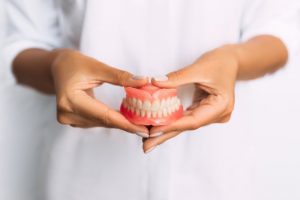
According to the American College of Prosthodontists (ACP), approximately 178 million people in the U.S. are missing at least one tooth. There are an estimated 40 million Americans who are missing all of their teeth.
Those are startling figures, but the truth is that nobody has to live that way with several tooth replacement options available to them, including dental implants and dentures. Dentures are a popular option and tough to beat when the cost is factored in, but do they check all the boxes?
One issue related to tooth loss is bone loss in your jaw. Keep reading to learn from your dentist in Glastonbury if dentures or implants can address jawbone preservation.
Why Does Bone Loss Occur in Your Jaw?
When chewing your food, you’re stimulating your jawbone via the roots of your teeth. This allows it to remain strong and healthy. However, if you have a missing tooth, that area of the jawbone isn’t being stimulated to the same extent, and your body will end up reabsorbing it over time. In the end, you could end up with physical changes like sunken cheeks and wrinkled lips that make you appear much older than you really are.
Can Dentures Address the Issue of Bone Loss?
Dentures can be life-changing for people who have lost most or all their teeth. Traditional dentures are secured by the natural suction of the mouth and restore the appearance and function of the smile. However, this type of denture doesn’t prevent bone loss because they don’t replace the roots of the missing teeth. Instead, they sit on top of the gums and don’t stimulate the jawbone.
How Do Dental Implants Affect Your Oral Health?
Dental implants are small titanium posts that are surgically inserted into the jawbone to replace the roots of missing teeth. Over time, the implant will fuse to the jawbone during a process called “osseointegration.” A customized crown, bridge, or denture is placed on the implant or series of implants. Here are some of the benefits:
- Jawbone Preservation: Unlike traditional dentures, implants replace the roots of the missing teeth and stimulate the jawbone. This keeps the jawbone from being reabsorbed by the body over time.
- Long Lifespan: Traditional dentures need to be repaired and replaced periodically. On the other hand, implants can last up to 25 years or longer with proper care.
- Stability: Implants can restore up to 90 percent of your chewing power, so you don’t have to worry about cutting out any of your favorite foods once they have healed completely.
Traditional dentures can be a great tooth replacement option for some people, especially when the cost is the priority, but they do not factor into jawbone preservation. Dental implants do impact the jawbone, however, and they may be the difference-making addition your smile needs!
About the Practice
At Glastonbury Dental Associates, we work hard to cultivate a reputation for providing a high standard of dental care that is made possible by four highly skilled dentists working together in one location. We do not pressure patients to get a specific treatment if it’s something they aren’t comfortable with. Mutual trust between patient and dentist is key, plus our staff will be as transparent as possible when it comes to pricing for treatments. While this blog post emphasized the impact of dental implants, dentures and dental bridges also have their benefits that we can discuss with you. To schedule a consultation and learn more about any of these tooth replacement options, visit our website or call (860) 633-3671.
